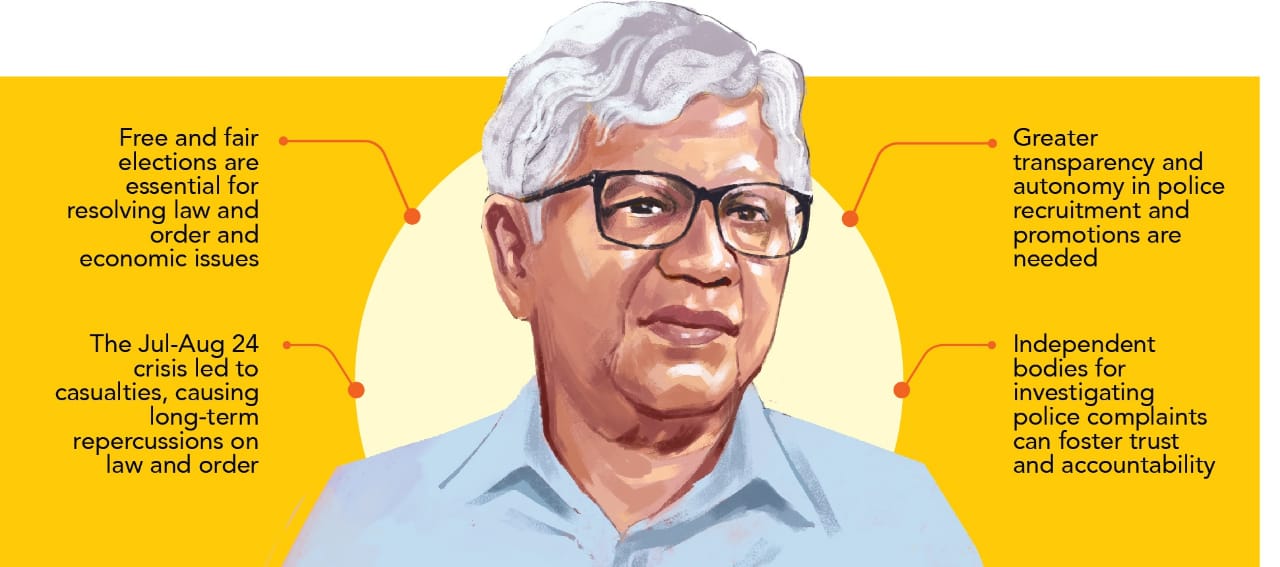Muhammad Nurul Huda, who served as inspector general of Bangladesh Police during 2000-2001, remarked that the political upheaval in July-August 2024 has left deep scars on the country. He pointed out that a major event had occurred, leaving long-lasting repercussions. The uprising in these months resulted in significant casualties, with many people killed and injured, including numerous police personnel. This tragic event was a turning point for the law enforcement agencies.
Data from multiple sources including Bangladesh Police indicate that the number of police fatalities during this period. Many police stations were looted, and several officers were implicated in political cases, leading to widespread discontent within the police force. This environment of heightened stress and trauma among police personnel is contributing to the current state of law and order. As a result, crime rates have spiked, with an increase in theft, robbery, extortion, and mob violence.
According to data from the Bangladesh Bureau of Statistics (BBS), criminal incidents such as armed robbery have increased by 15% from the previous year. This rise in criminal activities has been largely attributed to the lack of stability and the exploitation of the situation by criminal elements who are eager to take advantage of the uncertainty.
When asked how the situation could be improved, Huda emphasised the necessity of a political government formed through democratic elections. “A political government that emerges from free and fair elections is vital for addressing law and order issues and tackling the broader challenges in the economy and other sectors,” he said.
He said with such a government in place, the country would have the potential to focus on resolving the underlying issues that contribute to lawlessness, including the decline of factionalism and dynastic rule.
“The factionalism within political parties and dynastic governance has created a toxic environment that undermines the police force’s independence,” Huda said. “This has left the police force politically compromised and unable to effectively combat crime.”
Huda also addressed the issue of police reforms, underscoring the need for greater transparency and autonomy in police recruitment and promotions. Bangladesh’s current three-step recruitment process for police officers is quite similar to the processes followed by European countries like the UK and India. However, Huda questioned whether such a system was truly optimal for Bangladesh, given its unique socio-political context.
In terms of police promotions and postings, Huda suggested that while full independence for the police force might not be feasible, operational autonomy is a necessity. He emphasised that institutional independence is essential for effective policing and the prevention of corruption within the ranks.
A recent report from the home ministry highlighted that the police recruitment process in Bangladesh has been marred by nepotism and political interference. According to the report, over 25% of police recruits in the past decade have been found to have political connections, undermining the merit-based system. This issue has fuelled calls for greater transparency and the establishment of independent oversight bodies to ensure fair recruitment practices.
One of the key issues Huda raised was the need for reforms in how complaints against the police are handled. He suggested that Bangladesh could consider setting up independent bodies, similar to those found in countries like the UK, to investigate complaints against police officers. This would foster greater trust between the police and the public and ensure that law enforcement personnel are held accountable for their actions.
He also stressed that political parties must take responsibility for ensuring that no criminal activity occurs under their patronage. “Politicians must be vigilant and ensure that no one uses political connections to protect criminals or avoid justice,” Huda said. “This is critical for restoring the public’s faith in the legal system.”
The Former IGP believes that a multi-faceted approach is required to restore law and order in Bangladesh. This includes formation of a stable political government, police reforms focused on autonomy and transparency, and a commitment from political parties to fight factionalism and dynastic rule.
Only by addressing these fundamental issues, Huda argues, Bangladesh can hope to improve its law and order and secure a peaceful future for its citizens.


